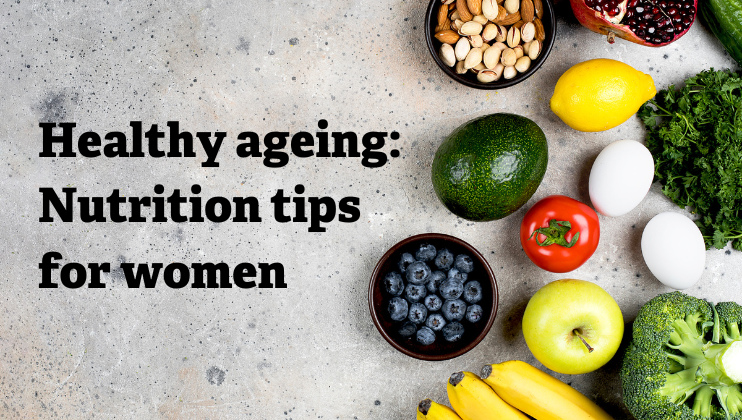Having a healthy diet can have great health and wellbeing benefits for women as they age – and making a few small changes could pay dividends in the future.
By changing a few day-to-day practices, you could reduce the risk of developing cardiovascular disease, breast cancer and osteoporosis – all while helping to manage day-to-day menopausal symptoms.
Below we share a few tips on how to improve bone health and heart health, as well as ways of managing menopausal symptoms through a healthy diet.
Please also let us know if you find these tips helpful in the feedback section at the bottom of the article.
Bone Health
- Ensure you have enough dairy:
When our oestrogen levels start declining, it can increase risk of bone fractures – so ensuring you have enough calcium can help improve bone health. Aim for 2-3 servings of dairy products per day (such as yoghurt, milk and cheese). It’s best to opt for lower fat options where you can.
Dairy products contain glycine which may also improve sleep.
- Weight-bearing exercises
Weight-bearing exercises such as walking, dancing and weight training also help to offset osteoporosis during the menopause.
- Vitamin D
Vitamin D enables our bones to absorb dietary calcium, which in turn improves health. 20 minutes of daily sun exposure will create an adequate level of vitamin D, but this can only be achieved from April to September in the UK. It is therefore recommended to take a vitamin D supplement of 10 micrograms per day from October to March.
Vitamin D is also required for proper immune function, DNA processes and mental health, as well as guarding against osteoporosis and potentially decreasing risk of premature menopause.
Heart Health
Menopause can increase your risk of developing heart disease, but eating a healthy diet can help to lower cholesterol levels and blood pressure, which can in turn lower your risk. Here are some very simple lifestyle changes you can make to reduce the risk:
- Switch from saturated to unsaturated fats by cutting down on fatty meats, switching to low -saturate oils and spreads, choosing lower fat dairy and grilling rather than frying your food
- Include fish, nuts, beans or pulses in meals at least once or twice each week
- Eat at least 4 to 5 portions of unsalted nuts, seeds and legumes per week
- Minimise your intake of free sugars like sweets, cakes, sugary drinks (including fruit juice), honey and syrup
- Reduce salt by avoiding processed foods like ready meals, soups and cooking sauces, and limiting salted snacks
- Aim for at least two portions of fish per week, one which should be oily as these are rich in omega-3 fats. Oily fish includes fresh/canned sardines, mackerel, salmon, trout and herring
- Fruit and vegetables provide vitamins, minerals, fibre and other plant nutrients such as antioxidants that help protect your heart. Aim to get your 10-a-day (5 minimum)
- Switch to higher fibre foods, such as high fibre breakfast cereals, brown rice and brown pasta whenever you can. Pulses like lentils, chickpeas and beans are all excellent sources of fibre and heart friendly.
Managing menopausal symptoms – diet and supplements
Plant oestrogens (also called phytoestrogens) are very similar to human oestrogen. If eaten regularly, and in sufficient quantities, they can start to have mild oestrogen-like effects, which is useful during and after the menopause.
For some women these effects could be sufficient to help relieve menopausal symptoms, particularly hot flushes. It is worth knowing that:
- it can take 2-3 months for benefits of plant oestrogens to be seen
- they seem to work better for some women than others
- consuming plant oestrogens several times a day appears to be more effective compared to one larger dose
- Foods containing plant oestrogens (such as soya and linseeds) are also heart friendly so it’s worth trying to include calcium-enriched soya products like milk, yoghurts, soya and linseed bread, edamame (soya) beans, flax seed, tofu, lentils and chickpeas 2-3 times each day before opting for supplements.
Women going through menopause may also see their mood decline, as well as memory issues and ‘brain fog’. The Mediterranean diet may help with brain health because it is rich in omega-3 fatty acids, other unsaturated fats, polyphenols and b vitamins. Find out more here.
Your sleep quality may make your ‘brain fog’ worse – so avoid eating large meals before bedtime and steer clear of spicy or acidic foods (they may cause hot flushes). Skip stimulants like caffeine, alcohol and nicotine before bed too, as they may disrupt your sleep.
Try our online courses and Groups on MyFFC
Find Out More
Our Find Out More – Healthy Eating course has more information on small changes you can make to your lifestyle, which could massively improve your overall wellbeing.
Online courses
Our full courses are designed to run over a number of weeks, to equip you with information and tools to overcome whatever life throws at you.
You can also join our Nutrition Group in MyFFC, or if you’re now in retirement our Living Well Groups group, where you can chat to others and share tips. Just ensure you’re registered with MyFFC and head to the ‘Groups’ tab at the top.
Please let us know if you found this article helpful, or if there’s anything you’d like us to have focused on more in the feedback section below.





